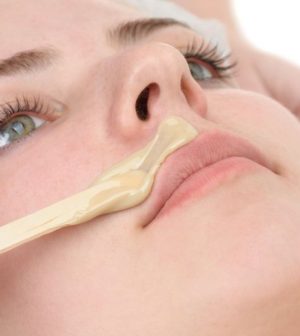- Could Your Grocery Store Meat Be Causing Recurring UTIs?
- Are You Making This Expensive Thermostat Error This Winter?
- Recognizing the Signs of Hypothyroidism
- 10 Strategies to Overcome Insomnia
- Could Artificial Sweeteners Be Aging the Brain Faster?
- Techniques for Soothing Your Nervous System
- Does the Water in Your House Smell Funny? Here’s Why
- Can a Daily Dose of Apple Cider Vinegar Actually Aid Weight Loss?
- 6 Health Beverages That Can Actually Spike Your Blood Sugar
- Treatment Options for Social Anxiety Disorder
Guideline Urges Hormone Test for Women With Unwanted Hair

Women with dark, coarse hair growth on the face, chest or back should be tested for polycystic ovary syndrome and other underlying health problems, a new Endocrine Society guideline says.
Hirsutism — the growth of unwanted hair in places where men typically grow hair, such as the face or chest — affects between 5 and 10 percent of women.
“Excess facial or body hair is not only distressing to women, it is often a symptom of an underlying medical problem,” Dr. Kathryn Martin, chairwoman of the guideline task force, said in a society news release. Martin is an endocrinologist at Massachusetts General Hospital in Boston.
“It is important to see your health care provider to find out what is causing the excess hair growth and treat it,” she added.
Hirsutism can be caused by polycystic ovary syndrome (PCOS), a common condition linked with infertility and metabolic health problems.
The guideline indicates that all women with hirsutism should have blood tests for testosterone and other male sex hormones called androgens. Women naturally have small amounts of these hormones, but levels tend to be higher in women with PCOS and other conditions that cause hirsutism.
The tests had previously been recommended only for women with moderate to severe hirsutism. The new guideline is meant to improve detection of PCOS and other underlying health conditions.
The new guideline will be published in the April print issue of The Journal of Clinical Endocrinology & Metabolism.
Mild cases of hirsutism with no sign of an underlying health condition can be treated with medication or direct hair removal, according to the Endocrine Society. Oral contraceptives are suggested as a first line of treatment for most women with hirsutism who are not trying to get pregnant.
In addition, the society recommends that women with hirsutism who are also obese may benefit from exercise and a healthy diet.
More information
The American Academy of Family Physicians has more on hirsutism.
Source: HealthDay
Copyright © 2026 HealthDay. All rights reserved.










